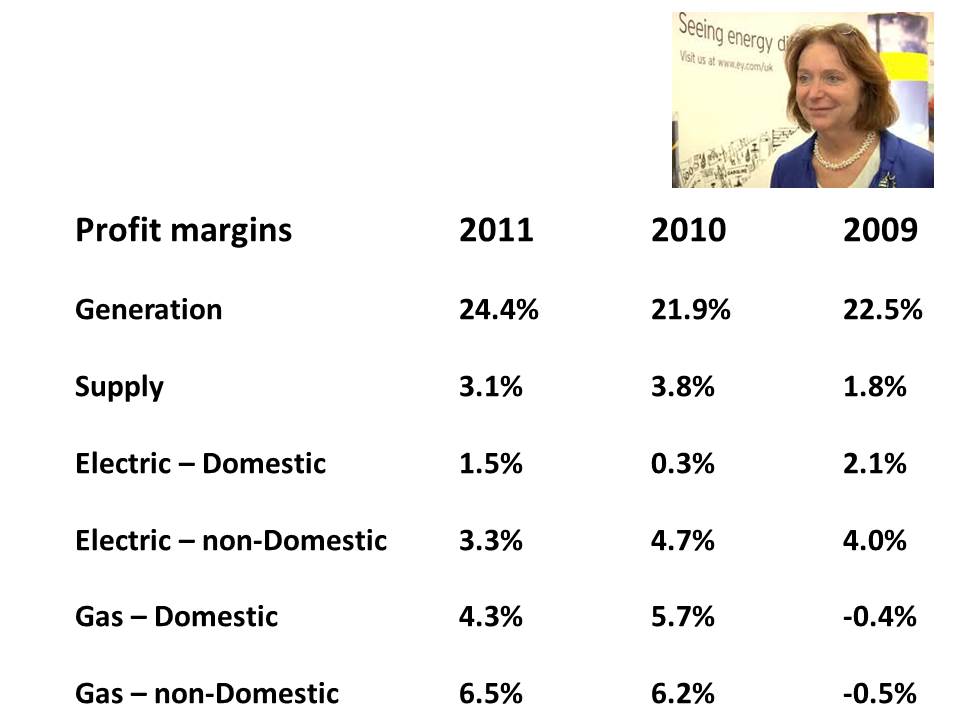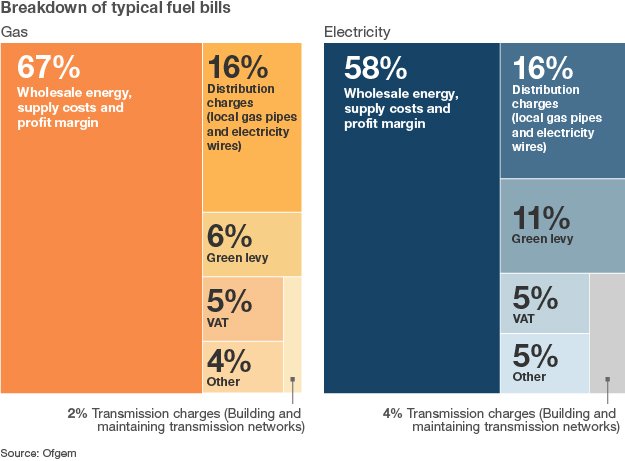A reader sent me an interesting comment/question on yesterday’s blog about our�rip-off energy companies: �”I�m normally with you David but this one makes me uneasy. Are you saying that a profit of 22% is too much and that governments should step in whenever a company makes that kind of profit? Where would you draw the line on this? 10% 15% 20%? Does this apply only to energy companies or to businesses in all sectors? There�s more to all this than meets the eye. There�s clearly a margin for competition to come along and undercut there but it seems that it isn�t happening. Why not?”
The reader seems to be asking�two main questions: 1.�What profit levels should the energy companies be allowed? 2. With such high profit margins, why is there not more competition?
Let me deal with the 2nd question first – why is there not more competition? The energy business consists of two main parts – “upstream” which is power generation and “downstream” which is power transmission and supply to customers. What the Big Six companies do is push up their profit margins to at least 24% on the “upstream” part (power generation)
This has two wonderful consequences;
1. They can claim they make small profits They charge themselves so much for the power they produce (or gas they supply to themselves) that they can only make a small profit – about 5% – on their “downstream” business. So, when they raise prices as they do every year, their PR people can come on TV and claim that they make very little profit (5% or so) while conveniently forgetting the massive profits made in the “upstream” part which is about two thirds of their costs
Oil companies play a similar game – pushing their profits into “upstream” (oil extraction) so they can claim they make very small profits on their filling stations.
2. They keep out competition It’s very difficult for a new competitor to enter the “upstream” business as it costs so much to build a new power station or gas platform. Competitors can easily enter the “downstream” part. But they have to buy their power and transmission from the Big Six. As the first chart shows, the Big Six charge so much for power (where they make their 24% profit margins)�that the profit margins on “downstream” are very small, giving little room for would-be competitors to undercut Big Six prices.
So, when our useless politicians tell us to switch suppliers, we’ll actually save very little as the Big Six have stitched up the market between them.
As for the first question What profit margins should power companies be allowed? When an essential service like power is being controlled by an oligopoly of just six (mainly foreign-owned) companies, then there is a need for a real regulator (not the worthless Ofgem)�to prevent market abuse. I believe that companies like French EDF, Spanish Iberdrola�and German E.0n are�only allowed to make profits of somewhere between 3% and 5% in�their�home markets. But according to my calculations, they’re making about 17% in Britain – 3�to 5 times as much as they’re allowed in their home markets, which of course is why foreign companies are so keen to buy Britain’s “cash cow” energy companies
As for the future of our energy prices,�it’s going to be a case of up, up, up thanks to the horror of the ludicrous Climate Change Act which was supported by all three major parties.
The current “strike price” for electricity is around �44 per MWh. But the offshore wind generating companies (mostly foreign) are going to receive �155/MWh (ie more than THREE times as much) for their intermittent totally unreliable electricity!
Wave and tide generated electricity will cost us �300/MWh – ie SIX times the current price. And nuclear will be at least twice the current price and probably much higher.
And the deranged Ed Davey tells us that his Green policies will result in a reduction in fuel bills of �144p/a by 2020.

















http://www.youtube.com/watch?feature=player_embedded&v=x-ibcORs4I4
O/T …..but I think we’re in trouble.
If you don’t want to watch it all ( it’s quite long)
consider this
In 1985 the government spent about �2,500 per person.
Today’s figure is around �10,500.
I hope he’s wrong.
For the first time in my life I’ll do as Cameron suggests. I’ll don my wooley jumper.
Thank you for elaborating further on this David. That’s very informative and quite easy to understand when presented in that format.
I still can’t quite agree with your conclusion that regulation is needed in order to prevent “market abuse” nor can I agree that government should impose any limits on the profit margins an energy company is allowed to make.
At once you concede that entry into the generation market it very difficult (“as it costs so much to build a new power station or gas platform.” – yes indeed, us mere mortals can only imagine just how difficult it is to build such a thing) and then go onto describe the product/service they provide as “essential” (many years ago, we did without such things, though).
Should we not be saying, “Thank goodness there are people out there with the ability and the foresight required to build such things so that we all get to enjoy this wonderful benefit, if we choose to use it and whatever the cost?”
Your line here tends to suggest that you agree with Miliband’s solution to put a price freeze on energy prices. That would seemingly have the effect of cutting into their generation profits.
It’s a slippery slope from there, though. What will they control next? YOUR business? MY business?
The principle that government can dictate prices will have been set.
What really needs to happen is for either one of these Big Six to break away from what appears to be a cartel and undercut their “competitors” or for a seventh to enter the market in a big way.
Regulation and price controls lessen the attraction for any would-be investor though and, as already pointed out, it’s already a major capital investment without them.
Further to that, something else has been fermenting away in my head for the last day or so. There’s still no rational explanation as to WHY the Big Six don’t compete “properly”.
I might be barking up the wrong tree here and my knowledge in this area is severely limited so if anyone is able to shed some more knowledgeable light, I’d be grateful but here goes…
These Green Taxes that the EU has imposed…
Is it not the case that if this “Green Energy” were to take off then would it not replace, to some extent, the energy companies’ product?
If this is the case then do we not have a grotesque situation whereby energy companies are actually being asked to fund something that could actually put them out of business (or at least drastically reduce their profits)?
If I’m anywhere close with this then could all this price-rigging not be some kind of protest backlash from the energy companies to these EU measures?
It might seem unfair that they’re doing so at the expense of the innocent general public but all’s fair in love and war and all that.
Perhaps they’ve determined to dig their heels in until the EU see sense on all this “Greenophilia”?
If I’m anywhere close with this then, yet again, governmental interference is at the root of the problem and this is one reason why more such interference can only make matters worse.
Don’t forget that 0.3% of all VAT collected in this country (and also across all European countries) goes straight into the (not signed off for 18 years by their own auditors!) coffers of the EU-SSR.
” . . . they�re making about 17% in Britain”
17% of what?